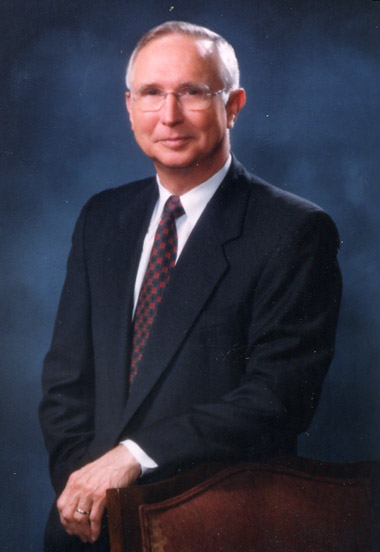Frank A. McPherson
Class of 2004
- Chairman and CEO, Retired Kerr-McGee Corporation

Education is one of the major keys to breaking the poverty cycle.
Born in Stillwell, Oklahoma, in 1933, Frank McPherson was raised on a farm that had no electricity or running water. His family burned wood for heating and cooking and mostly grew what they ate, fresh vegetables in the summer and canned vegetables in the winter. They had hogs for meat and cows for milk.
McPherson's father was a sharecropper in those early years, giving one-third of his crop to the owner of the land. "It was important to my father to take care of our family," says McPherson. "All he knew was hard work, but he was very gentle, patient, and kind."
As a youth, McPherson did not realize just how poor his family was. He remembers when he was about seven, they had three or four cows, whose milk they sold for cash. "We got about $4 a week from selling milk," he says. "We survived by working together."
McPherson's mother, whom he also describes as kind and loving, brought levity and laughter to the family throughout their arduous days. "She played pranks on us," he recalls. "She gave us a lighter side, and we were a happy family."
Work was a part of everyday life for McPherson. He helped with the milking and also plowed with a team of horses. When he was 11, the family acquired a farm and began selling milk from 12 dairy cows, raising and selling hogs, and starting to accumulate beef cattle. On the new farm, they also raised and sold strawberries. When McPherson was 13 and again when he was 14, his father suffered two serious illnesses that required the young boy to do a significant part of the farm work.
By the end of McPherson's junior year in high school, his father wanted him to see something beyond the farm. "My father didn't have much education," he says, "but he was one of the wisest individuals I've ever known."
To broaden his horizons, McPherson, then 17, began spending summers away from home. He worked on a dredge boat in Galveston Bay, on a riverboat tug on the Mississippi River, and in a shipyard in Houston. He discovered that he could make the most money roughnecking on offshore drilling rigs in the Gulf of Mexico, where he worked for two summers. He found the oil industry fascinating and observed that managers and superintendents mostly had engineering degrees. He attended Oklahoma State University and majored in mechanical and petroleum engineering.
McPherson joined the U.S. Air Force ROTC program and was accepted into the advanced program for pilot training. Upon graduation in 1957, he was commissioned a second lieutenant. While waiting to begin military service, he worked for nine months for Kerr-McGee Corp. as a trainee engineer in its Gulf of Mexico oil and gas operations. He completed his rotation with the Air Force in three years and returned to Kerr-McGee, starting as a staff petroleum engineer in corporate headquarters.
During his 37-year career with Kerr-McGee, McPherson served as a staff petroleum engineer at corporate headquarters, and then he transferred to its Gulf oil and gas operations. After that, he was promoted to district engineer, and then became a production superintendent in charge of all offshore production operations. From there, he became a drilling superintendent, then the general manager for the company's offshore drilling and producing operations in the Gulf.
In 1973, he was transferred back to headquarters to start a new venture for the company: coal. Later that year, Kerr-McGee named McPherson president of its new coal mining subsidiary. He was responsible for building a large mining operation in Wyoming, which later became the third largest in the country and one of the most profitable.
In 1976, McPherson was put in charge of Kerr-McGee's uranium mining and conversion subsidiary. Two years later, he became vice chairman responsible for two additional subsidiaries. In 1983, he became the chairman and CEO. The year before, Kerr-McGee stock was trading at less than $29; by the time he retired in 1997, it was at $70. McPherson has been praised for his vision and leadership in guiding the company through difficult times and transforming it into a successful global competitor.
In advising youth, McPherson says, "Be willing to risk your career by taking difficult assignments. Work hard and remember that often there is a narrow margin that separates success from failure. In my experience, hard work, ingenuity, and perseverance always win." McPherson offers a series of "nevers" as advice: "Never stop learning. Never be too proud to admit you don't know. Never be too proud to ask for help. Never compromise your ethical behavior or integrity, which is easy to lose but difficult to regain."
McPherson says he is humbled by his Horatio Alger Award and is especially interested in the Association's scholarship programs. "There is no cause more noble than giving deserving youth the opportunity to rise above adverse circumstances and to realize their full potential in life. Education is the key for them to have a full and productive life."
McPherson is the first to say that his success did not come only through his personal efforts. "Whatever success and accomplishments I have achieved in my life I have to give credit to God, my wife, my parents, my teachers and mentors, and my fellow employees who helped me and supported me in my life," he says. "I wouldn't have amounted to much without all of them."
